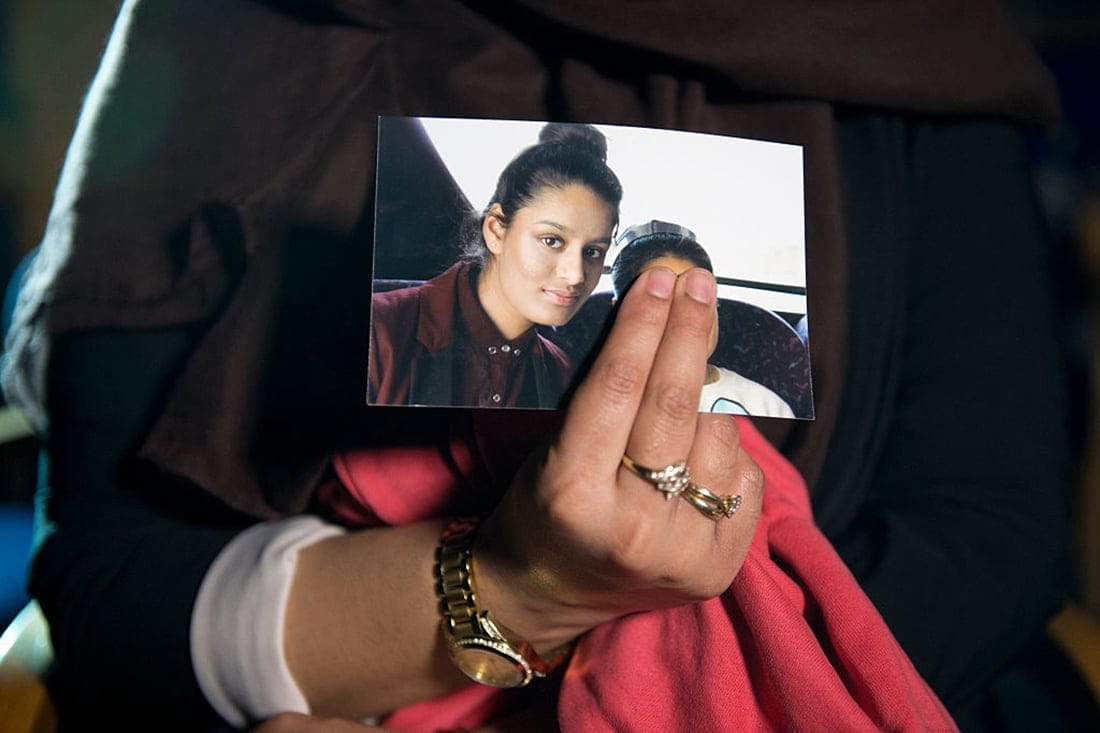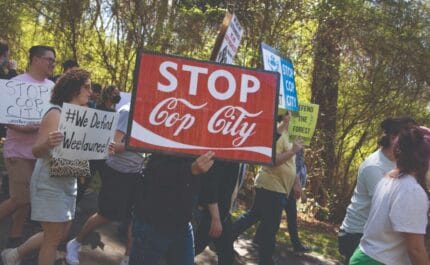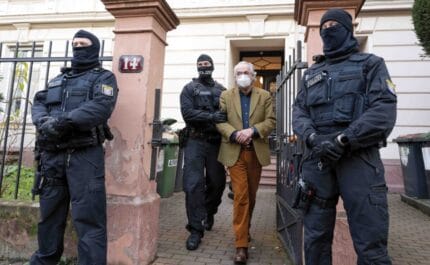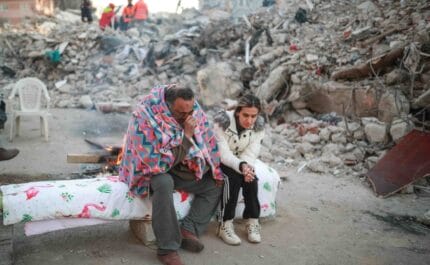Moment that mattered: The UK government moves to revoke Shamima Begum’s citizenship
On Valentine’s Day 2019, The Times published an article by Anthony Loyd in which the reporter revealed he had discovered the whereabouts of missing ‘jihadi bride’ Shamima Begum, one of three Bethnal Green schoolgirls who had run away to join the Islamic State four years previously. In Loyd’s interview with her, conducted in Syria’s Hawl refugee camp, Begum, who was nine months pregnant at the time, expressed her desire to return to the UK but also said she had no regrets about joining Isis. In DG #34, Loyd reflected on the then-home secretary’s decision five days later to revoke her British citizenship and on the wave of public controversy his scoop triggered

Renu Begum, eldest sister of Shamima Begum, holds her sister's photo on 22nd February 2015 in London. Laura Lean/WPA Pool/Getty Images
19th February 2019 (Taken from: #34)
“For four years after she left the UK Shamima Begum didn’t have her citizenship revoked. Then, six days after my interview with her was published [in The Times on 13th February], the home secretary, Sajid Javid, suddenly said he was revoking it. I don’t think it’s necessary to say too much about Javid’s hastiness and opportunism, but it’s clear that the decision came after a huge populist swell of rage.
“I wasn’t surprised by the intensity of the public interest in my article because when Begum and her two schoolmates ran away from home in east London to join Islamic State in 2015 it was a big story. But I hadn’t anticipated the rage. Of course we’ve had a series of terror attacks in the UK so there is a febrile emotional reaction to anything to do with the Islamic State, but I still believed that since this was about a 15-year-old runaway schoolgirl who had spent the formative years of her life within the ‘caliphate’, there would be some kind of concern given the circumstances. I did not anticipate that the nation, by and large, would go batshit crazy.
“I was in Syria on the day of publication. I woke early because I had a long drive out of the country, through quite a bit of Iraq, and to my flight home. I hadn’t really looked at the story and by the time I arrived in the UK I was maybe 36 hours behind in realising how big the debate had become. The Times encourages journalists to engage with readers in its online comments sections. The people who comment are not necessarily representative of one’s readership, and there were some fair, moderate and articulate comments in there, but there were an awful lot more enraged, brutish and hateful comments.
The story became centred around who we think we are, who we want in our society and how we deal with people we don’t like”
“This is the first time I’ve encountered such rage, towards both the subject of the story and the messenger. For the first time in my life I received volumes of hate mail, people calling me a threat to our society and a terrorist sympathiser for suggesting that Begum should be brought home to be investigated. Had this story occurred at a different time in our nation’s history, the reaction might have been different. Many of the emotions are less about Begum and more about the confusion and anger in this country at the moment of an identity crisis. The story became centred around who we think we are, who we want in our society and how we deal with people we don’t like.
“Some argued that I was giving a platform to an extremist. But the question of what we do with British citizens who joined Islamic State – the fighters, the women, the children – is extremely complicated, challenging and important. I did a very straight-bat interview and the complexity of the case was worked into the story. I didn’t feel I was giving a platform to extremist propaganda. I felt I was airing the position of an indoctrinated young woman and British citizen who left the UK as a child.
“I understand the concern that bringing back British jihadists will increase the potential for terror attacks in the UK. But right now we are saying, ‘Don’t bring them back: leave them in one of the most insecure places in the world, kettled with thousands of like-minded souls in a country that doesn’t want them.’ Well, that’s not a solution. I’m not sure we’ve got the legal or prison infrastructure to cope with bringing everyone back, investigating them and putting them on trial. But we can deal with this on a case-by-case basis. First, let’s look at the children, who are not guilty of any terror crime, and work out how to repatriate them. Shamima is a complicated case because she went as a child and became an adult there. I would still say, bring her back and investigate her here.
“Speculating over whether she feels remorse is a ridiculous notion. People were saying, ‘She wasn’t shocked’ or ‘She wasn’t traumatised’. My God, by the time I last saw her, months after our first meeting, she had lost three kids in eight months, been in airstrikes, seen friends of hers killed, been in battles… These commenters have no idea of the extreme stresses of war and child loss. It’s ludicrous to think she’s not traumatised because she doesn’t look traumatised. Yes, she has a slightly odd manner, but I think she’d have that odd manner if she’d stayed in the UK.
“Did I feel sympathy for her? I didn’t dislike her. I felt like I was in the presence of a very messed-up young woman who made a cataclysmic series of bad choices as a child and has suffered egregiously for those choices. Whether that’s sympathy or empathy I’m not sure. In April 2018 I interviewed Alexanda Kotey and El Shafee el Sheikh [British Isis recruits and members of the so-called ‘Beatles’ terror cell]. Their hostages included friends of mine; some were killed, some survived. It was a complicated interview because I did not like them, but my job was to mask my dislike and learn what I could. They were smart, tough, skilled, highly indoctrinated members of the Islamic State and were totally unapologetic. They had thought through what their position was and how best to play it, and their responses were quite contrived.
It’s pretty lucky in a camp of over 40,000 people that the woman I was looking for was within earshot”
“Shamima Begum wasn’t like that. She was in a state of shock. She was fresh out the ‘caliphate’ and it was raw. The way her voice and tone modulated when I asked if she would be a threat to British society… Her brow creased and her face fell and she said, ‘Of course not’ – it was very real. She expressed doubt over the ‘caliphate’ in a camp where she would have been vulnerable to all sorts of intimidation – people had their tents burned down if they spoke out against Islamic State – which suggests to me that her doubts were real. It also suggests the presence of independent thought and that given the correct deradicalisation pressures she could be brought back into the fold. That’s not to say that she shouldn’t be investigated to see what she did there.
“It’s hard to predict what will happen to Begum. I suspect that she will return to the UK at some point as a British citizen for an investigation and trial. I think this will take a long time. Begum is being represented by the lawyer Gareth Peirce, who is challenging the revocation of her citizenship. My understanding is that it’s illegal to revoke her citizenship because she is not eligible for Bangladeshi citizenship [as Javid had suggested when explaining his decision] and would be left stateless.
“When I went looking for her I didn’t know if she was still alive. I’d been in Baghouz [the last Syrian territory held by Isis, taken by Kurdish-led forces in March 2019] covering the fighting and I became interested in who was leaving Baghouz and where they were going. Women, children and some men, were going to the al-Hawl camp, so I applied for access, went and got turned away. I tried again with the right paperwork, but was told there were no British women there.
“At one point I was chatting with the administration staff in a hut, a conversation going on vaguely over many cups of tea and cigarettes, and a nurse I knew from an NGO walked in. She heard this administrator say that there were no British women in the camp, and when he walked out she muttered to me, ‘He’s lying.’ So I thought, ‘Let’s stick with this a bit longer.’ It took ages, sitting in this room trying to keep the conversation going, and eventually the administrator said, ‘OK, look, I’ll get you someone.’ He said afterwards that he had just walked out and said to a group of women that there’s a British journalist who wants to speak to foreign Islamic State wives, and two women stepped forward. One was Shamima Begum.
“Was it a coincidence? It’s pretty lucky in a camp of over 40,000 people that the woman I was looking for was within earshot. Maybe there was some serendipity, but I knew where to look. I’ve spent an awful lot of time in Syria and you begin to get a sense of these things.
“I had a drink with a friend the other day and he told me that the opening line on my Wikipedia entry is ‘Anthony Loyd is a British journalist who gained notoriety when he tracked down Shamima Begum.’ And I thought, ‘I’ve spent 26 years hauling my arse around warzones. I’ve been in jail several times, been a hostage, been shot, had fucking ten bells knocked out of me in various countries while reporting, and the end result is that I’m notorious on Wikipedia because I found a 19-year-old girl.
“But you know what? I’m really pleased I found her. It’s an important story and it’s every bit as much about who we are as about who she is.”
Slow Journalism in your inbox, plus infographics, offers and more: sign up for the free DG newsletter. Sign me up
Thanks for signing up.








